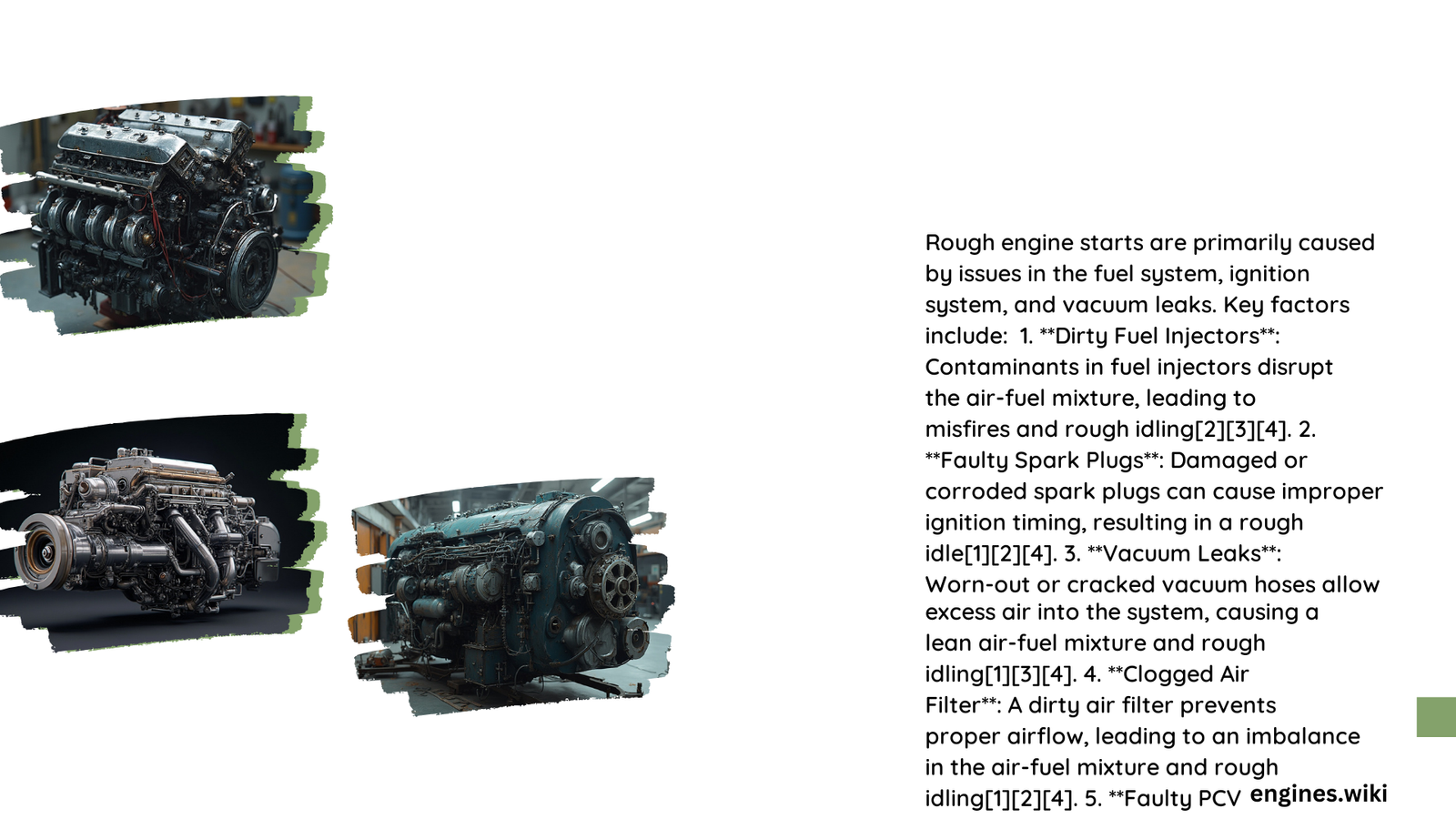Rough engine starts can be caused by various factors, including fuel system issues, ignition system malfunctions, worn engine components, air intake problems, and vacuum leaks. These issues can lead to poor performance, decreased fuel efficiency, and potential long-term damage if left unaddressed. Understanding the root causes and their symptoms is crucial for effective diagnosis and timely repairs.
What Are the Main Fuel System Issues That Cause Rough Engine Starts?
Fuel system problems are among the most common causes of rough engine starts. Here are the key issues to consider:
Clogged Fuel Filter
A clogged fuel filter can significantly impact engine performance and starting:
- Symptoms:
- Poor engine performance
- Stalling
- Hard starts
- Reduced fuel efficiency
-
Diagnosis: Check the fuel filter for blockages. Poor engine performance and difficulty starting are telltale signs.
-
Repair: Replace the fuel filter. It’s recommended to change it every 20,000 to 30,000 miles.
Failing Fuel Pump
A failing fuel pump can cause various starting and performance issues:
- Symptoms:
- Sputtering at high speeds
- Difficulty starting
- Stalling
- Noticeable drop in fuel efficiency
-
Whining noises from the engine
-
Diagnosis: Use a fuel pressure gauge to check if pressure drops when symptoms occur. Also, inspect for corroded fuel pump electronic modules or faulty wiring.
-
Repair: Replace the fuel pump. Ensure the fuel tank is clean to prolong the new pump’s lifespan.
Dirty or Clogged Fuel Injectors
Fuel injector issues can lead to various performance problems:
- Symptoms:
- Rough idling
- Poor acceleration
- Engine misfires
- Decreased fuel efficiency
-
Trouble starting the car
-
Diagnosis: Use fuel injector cleaning additives for minor blockages. Severe clogs may require professional inspection.
-
Repair:
- Minor blockages: Use fuel injector cleaning additives
- Severe clogs: Professional cleaning or replacement
Contaminated Fuel
Contaminated fuel can cause significant engine problems:
- Symptoms:
- Engine sputtering
- Stalling
- Hesitation during acceleration
- Decreased performance
-
Illuminated check engine light
-
Diagnosis: Inspect the fuel tank for water, dirt, or other impurities.
-
Repair:
- Drain and clean the fuel tank
- Use high-quality fuel
- Keep the fuel cap properly sealed to prevent future contamination
How Do Ignition System Malfunctions Contribute to Rough Engine Starts?

Ignition system issues are another major contributor to rough engine starts. Here are the primary concerns:
Faulty Spark Plugs
Spark plugs play a crucial role in engine performance:
- Symptoms:
- Rough engine starts
- Misfires
-
Decreased engine performance
-
Diagnosis:
- Use a spark tester to check for spark at each cylinder
-
Inspect spark plug wires and boots for wear or damage
-
Repair: Replace the spark plugs. Cost typically ranges from $100 to $300 for a set, depending on the vehicle and type of spark plugs.
Ignition Coil Failure
Ignition coils are essential for proper spark plug function:
- Symptoms:
- Rough engine starts
- Misfires
- Decreased engine performance
-
Illuminated check engine light
-
Diagnosis: Use a multimeter to test the ignition coil’s resistance and voltage output.
-
Repair: Replace the ignition coil. Cost can range from $50 to $200 per coil, depending on the vehicle and type of ignition coil.
What Role Do Worn Engine Components Play in Rough Engine Starts?
Worn engine components can significantly impact engine performance and starting:
Worn Piston Rings
Piston rings are crucial for maintaining proper compression:
- Symptoms:
- Rough engine starts
- Decreased engine performance
-
Increased oil consumption
-
Diagnosis: Perform a compression test to check for low compression in one or more cylinders.
-
Repair:
- Replace the piston rings
- In severe cases, replace the entire engine
- Cost can range from $1,000 to $5,000 or more, depending on the extent of the repair
Damaged Valves
Valves control the flow of air and fuel into the engine:
- Symptoms:
- Rough engine starts
- Decreased engine performance
-
Possible oil leaks
-
Diagnosis: Perform a leak-down test to check for air leaks through the valves.
-
Repair:
- Replace the damaged valves
- Cost can range from $500 to $2,000 or more, depending on the complexity of the repair and the vehicle
How Do Air Intake Problems Affect Engine Starting?
Air intake issues can significantly impact engine performance and starting:
Dirty Air Filter
A clean air filter is essential for proper engine function:
- Symptoms:
- Rough engine starts
- Decreased engine performance
-
Reduced fuel efficiency
-
Diagnosis: Inspect the air filter for dirt and debris.
-
Repair: Replace the air filter. Cost is typically around $10 to $30 for a standard air filter.
Malfunctioning Mass Airflow Sensor
The mass airflow sensor measures the amount of air entering the engine:
- Symptoms:
- Rough engine starts
- Decreased engine performance
-
Possible stalling
-
Diagnosis:
- Use a scan tool to check for trouble codes related to the mass airflow sensor
-
Clean or replace the sensor as needed
-
Repair:
- Clean or replace the mass airflow sensor
- Cost can range from $50 to $200, depending on the vehicle and type of sensor
What Impact Do Vacuum Leaks Have on Engine Starting?
Vacuum leaks can cause various engine performance issues:
- Symptoms:
- Rough idle
- Engine misfires
- Engine may rev up and down
-
Abnormal idle speed
-
Diagnosis:
- Check vacuum hoses for leaks
- Test components like intake manifold gaskets, vacuum brake boosters, or vacuum supply tanks
-
Use WD40 to test for leaks around the intake manifold
-
Repair:
- Repair or replace the leaking component
- This could involve reinstalling a dislodged vacuum hose or replacing gaskets or other components
By understanding these common causes of rough engine starts, you can better diagnose and address issues with your vehicle. Regular maintenance and prompt attention to any symptoms can help prevent more serious problems and ensure your engine starts smoothly and runs efficiently.
